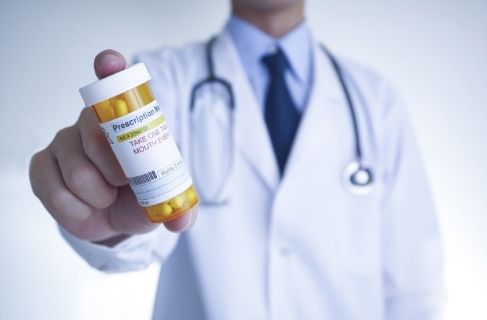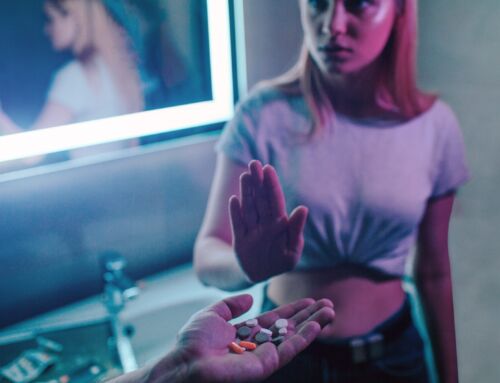Medication-Assisted Treatment, or otherwise known as MAT, is the use of medications to offer effective treatment of opioid use disorders (OUD) and opioid addiction. In its most effective usage, MAT is combined with counseling, therapy, and other behavioral therapies. In some instances, MAT is used as a singular approach, offering patients FDA-approved medications in place of more dangerous prescription narcotics that may be misused or street drugs such as heroin and fentanyl.
Medication-Assisted Treatment is also an effective harm reduction strategy employed to keep people alive, help them moderate or stop using dangerous drugs and use MAT prescription medications as an alternative. By utilizing MAT medications under the care of a medical professional, individuals lessen their chances of fatal and non-fatal overdoses, as well as reduce the risk of disease transmission.
Medications Used in Medication-Assisted Treatment (MAT)
Buprenorphine
Buprenorphine is an FDA-approved prescription medication for those that have opioid addiction or opioid dependence issues. Buprenorphine is administrated orally, sublingually, or through injection, typically daily or multiple times daily. It is often used to curb opioid cravings and keep the body from experiencing withdrawal symptoms.
Suboxone
Suboxone is a prescription medication that contains both buprenorphine and naloxone. As mentioned above, buprenorphine is an opioid medication that helps to stop opioid cravings and keep individuals from experiencing withdrawal, while naloxone is a medication that blocks the effects of opioids and opioid medications.
Sublocade
Sublocade is a prescription medication injection that needs to be given by a certified healthcare provider. It is an injectable form of buprenorphine used to treat adults with moderate to severe addiction or dependence to opioids. It is an extended-release form of buprenorphine that is injected monthly.
Naltrexone
Naltrexone is an FDA-approved medication that can be helpful in the treatment of both opioid use disorder and alcohol use disorder. Naltrexone is an effective medication for someone suffering from opioid dependence or opioid addiction, as well as individuals dealing with alcoholism or other drinking problems. Naltrexone is a drug that blocks the effects of opioids, including pain relief and feelings of well-being.
Vivitrol
Vivitrol is an injected form of naltrexone, or what is the brand name for naltrexone for extended-released injectable suspension. Vivitrol is injected and helps to both stop craving and block the euphoric effects of both opioids and alcohol by reducing the urge to drink or use drugs. Vivitrol is a monthly injection. Due to the way the drug works in the body, individuals taking Vivitrol typically need to be substance free between 7-to-14 days before receiving their first Vivitrol shot.
Methadone
Methadone is an opioid drug that is FDA-approved in the treatment of opioid addiction or opioid use disorder. Created during World War II and used by doctors to treat patients with extreme pain and to help soldiers recover, methadone is only available through a provider. Methadone is effective in blocking the high from other opioid drugs, like heroin, fentanyl, codeine, oxycodone, or hydrocodone.
Medication-Assisted Treatment and not Medication-AS-Treatment
Here at Maryland Addiction Recovery Center, we understand the importance and effectiveness of medication-assisted treatment (MAT) and the vital role that medications play as part of a comprehensive approach in the treatment of addiction. This includes many of the medications listed above in regard to medication-assisted treatment, but also other medications that are vital in stabilizing and treating patients that suffer from co-occurring mental health or psychiatric issues.
However, we also are aware of some of the dangerous trends in healthcare that have been occurring related to medication-assisted treatment. Most often, this comes in the form of providers using medications as replacement therapy- basically helping an individual stop illicit or dangerous opioid use and misuse with another medication. This is an important harm reduction approach and is beneficial to possibly helping someone stop using dangerous drugs off of the street or preventing overdose, but it is not a treatment approach or strategy. Harm reduction is vital to keeping people alive, and it can be used in numerous ways within a treatment approach, but we believe that the most effective medication-assisted treatment (MAT) approach is part of a larger, comprehensive treatment strategy. Therefore, here at MARC, we utilize numerous forms of MAT as part of a comprehensive approach that treats not only the symptoms of addiction (the drug use, misuse, and abuse) but also the deeper core issues, underlying causes and conditions, attitude, beliefs, and behaviors. We go further by incorporating and developing important life skills, examining and reconstructing family and interpersonal relationships, and incorporating direction, meaning, and purpose through academics, education, employment, or career focus and reengagement.
Recovery is a wheel with numerous spokes, and to achieve long-lasting, sustainable recovery, all the spokes of that wheel must be addressed and strengthened. One of those spokes certainly is medication-assisted treatment and the role it can play in not only keeping individuals alive to find recovery, but a vital role in enhancing the treatment experience and supporting that lifelong recovery.
If you or someone you know needs help for addiction or co-occurring disorder issues, please give us a call. Maryland Addiction Recovery Center offers the most comprehensive dual diagnosis addiction treatment in the Mid-Atlantic area. If we aren’t the best fit for you or your loved one, we will take the necessary time to work with you to find a treatment center or provider that better fits your needs. Please give us a call at (410) 773-0500 or email our team at info@marylandaddictionrecovery.com. For more information on all of our drug addiction, alcohol addiction and co-occurring disorder services and recovery resources, please visit our web site at www.marylandaddictionrecovery.com.






